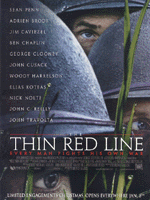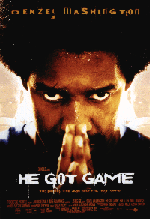
| In This Issue |
 |
| Negro Comix |
 |
 |
![]()
After the debacle of Barber of Siberia just a few short weeks ago, it was not without some trepidation that I took my seat to see another brand-spanking-new Russian film starring Oleg Menshikov whose release had been accompanied by a similarly heavy advertising blitz. But at half the length and with just 1/15th of the budget (although still huge by Russian standards at $3 million), Denis Yevstigneyev's Mama is at least four times the film that Mikhalkov's clumsy political advert is.
Using the true-life, half-baked attempt of a Brezhnev-era family musical ensemble (sort of an all-male Soviet version of the Partridge Family) to hijack an Aeroflot flight and defect to America after their popularity had waned as its jumping off point, Yevstigneyev's second feature film is absurdly tragic,
 |
As what's left of the family reunites in present-day Moscow after 15 years of jail terms, children's homes, and internal exile to the farthest reaches of the Soviet empire, their fruitless attempts to come to terms with the past and the new world that has developed in their absence are depicted in a syncopated chain of alternately humorous and nostalgic episodes. One brother heads for the zoo, where he chats up a caged zebra--in fond remembrance of the representative of that species he recently chowed on as an unpaid miner down in Ukraine. Another heads for a deserted rooftop with his sniper's rifle and takes aim Texas-belltower-style at some young ballerinas in training before finally getting his rocks off by shooting out one of the red stars atop the Kremlin. The Don Juan of the family (a sailor who had until recently been stationed in some remote Eskimo-land where he was the only male around with potent sperm) tries his luck with a dial-a-whore. The youngest, originally introduced as an employee at the "Golodnaya Utka" bar in Vladivostok (with some dated-looking location shots inside the real-life Moscow Duck that take on a special resonance in wake of recent events), penniless and jonezing hard, heads south to the university (MGU, unrealistically enough) and does a dance for drugs before the appreciative African students hanging on the steps. Meanwhile, older brother Menshikov rocks back and forth drooling and mumbling in his wheelchair in a Dickensian nuthouse--a performance not appreciably different from that in Mikhalkov's Barber, but at least he's not speaking broken English.
 |
A handful of nice stylistic touches keep things moving along nicely as the emotional weight imperceptibly accumulates. For one thing, there's the schmaltzy flugel horn-heavy score. This sort of thing went out in Hollywood at about the time Karen Carpenter was purging her last ever binge, but fortunately post-Soviet film composers are still happily reveling in that genre's peculiar glories. The style is especially fitting here, especially as it is occasionally broken up with the musical group's signature upbeat Cuban number. What I'm guessing is some skillful makeup work combines with superb casting to give the four non-Menshikov brothers (at least in their adult incarnations) a surprisingly plausible sibling resemblance. I suppose you could accuse me of betraying a certain latent "all Russians look alike" racism with this statement, but I stand by it, nevertheless. Even the allusion to Quentin Tarantino's black hitman suit (itself a borrowing from Hong Kong gangster films) is well handled--low-keyed and unselfconsciously.
My only real complaint is that too much of the budget was wasted on aerial introductory shots from helicopters rather splurging for digital surround sound. As a result, it seems like the film's soundtrack is playing through an antique TV speaker when it follows the ear-splitting Lost in Space trailer (which, not surprisingly, is rather more enjoyable than the actual movie), as Mama currently does at the Pushkinsky Cinema.
Damn, I'm really not used to operating in positivity mode these days, and it shows. Fortunately, the other new films give me a chance to vent my spleen, although I'll try to keep it brief. This week's avoid-at-all-costs option is
 |
Inexplicably nominated for a whole heap of Oscars (but winning none), this appears to be some kind of war flick for chicks (a new spin-off from the popular disaster flick for chicks genre) that has no business pleasing anyone. I suppose the film's rampant critical acclaim is explained by director Terrence Malick's untouchable status as some kind of low-output legend. His reputation is based almost entirely on the 1973 film Badlands (and secondarily, 1978's Days of Heaven), which among other things went along way toward inspiring Oliver Stone's Natural Born Killers. Sissy Spacek played the Juliette Lewis role, for Christ's sake. Poke around a bit and you'll see that almost every working hack in the business points to Badlands as one of the best films ever made, but personally I doubt that many of them have ever even watched it (and certainly not within the last 10 years). Hell, I've never seen it either, but just to even up the statistical odds a bit, allow me state for the record that I think it sucks.
If hearing a nonsensical string of simplistic "transcendental" metaphors and similes uttered by various dumbshit narrators with poorly approximated Southern drawls (southerners, of course, being the only Americans with the natural capacity for spirituality) is your idea of fun, then be my guest. It's like a horde of Woody Harrelsons (whose "I blew my butt off" line is the film's only keeper) is running amok with guns and grenades on Guadalcanal Island just so they can read you their derivative intro-philosophy essays. Not to mention that they all look like either Henry Rollins or a pudgy Kevin Bacon. Except for a mustachioed John Travolta, who bears a disturbing resemblance to Freddie Mercury and seems to be reliving his Face/Off Nick Cage impression during his mercifully brief cameo.
You'd be better off watching just about anything other than this, including any of the many similarly titled features. For starters, there's the original adaptation of James Jones novel from 1964, a perfectly serviceable war film with Keir Dullea and Jack Warden. Even better, how about Errol Morris's 1988 documentary The Thin Blue Line, which depicts the failings of a imperiously corrupt Dallas County criminal justice system. For the more adventurous, there's even Blue Line, a 1985 Canadian film described by one Internet Movie Database user as being about "a young girl who shows a bunch of old men a good time" (although I seem to remember it being about an after-school special affair about a long-distance runner), and an identically named mid-90s Italian job. Good luck, gang.
Just as Spike Lee's version
 |
The basketball sequences were supposed to be impressively balletic and all, but that's just the press kit talking. For one thing, the Aaron Copland background music doesn't jive with the slo-mo playground shots, especially after those salad dressing commercials. Nor are these scenes even the main focus--Spike is more concerned with the inner workings and power plays of the basketball business. This can be effective when Spike keeps it brutally real, but his tendency to editorialize and overstate the obvious almost always manages to fuck things up. I suppose he deserves a certain amount of respect for courageously sticking to his guns by keeping his films adamantly un-dramatic, but for those who are already aware that pro ball (like most other businesses in America) is a corporate-run machine that chews good people up and spits them out as horse feed it all seems kind of pointless.
On the plus side: Milwaukee Buck Ray Allen's impressive performance as the sought-after high school superstar. On the minus side: Milla Jovovich's non-naked appearance in a confounding side-plot and Public Enemy coming back from the dead to team up with the apparently still-sucking-air Stephen Stills on the spotty main title theme.


